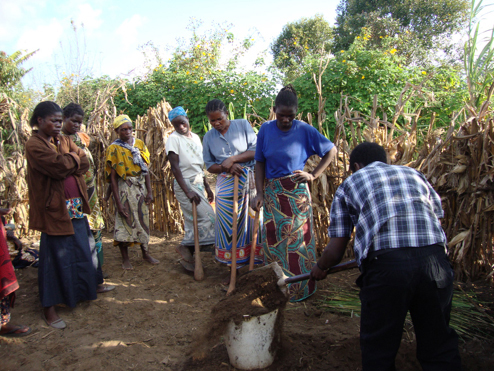
Millions of people in Malawi face food insecurity and potential starvation each year. More than half of Malawi’s population lives below the poverty line, and an estimated 37 percent of children under 5 are chronically malnourished. Eighty percent of the population lives on subsistence farming, many relying solely on rain to irrigate their crops; families headed by women are more likely to be food insecure than the average. This year, due to changes to the government’s tax structure and extremely high inflation rates, farmers have even more difficulty purchasing the seed, fertilizer, and farming tools they need in order to feed their families.
According to our partner Ecology Action, Grow Biointensive practices can help farmers grow more food using fewer resources by mobilizing composting for moisture retention and soil quality improvement. This project expands upon previous BGR-funded work to continue to help families attain food security through training in Grow Biointensive climate-resilient agriculture methods. Working from a demonstration farm in northern Malawi, the project is training 2,200 farmers, including 1,220 women, in methods such as compost making, crop management, seed production and seed banking, and food security strategies. Annually renewable project.

Millions of people in Malawi face food insecurity and potential starvation each year. More than half of Malawi’s population lives below the poverty line, and an estimated 37 percent of children under 5 are chronically malnourished. Eighty percent of the population lives on subsistence farming, many relying solely on rain to irrigate their crops; families headed by women are more likely to be food insecure than the average. This year, due to changes to the government’s tax structure and extremely high inflation rates, farmers have even more difficulty purchasing the seed, fertilizer, and farming tools they need in order to feed their families.
According to our partner Ecology Action, Grow Biointensive practices can help farmers grow more food using fewer resources by mobilizing composting for moisture retention and soil quality improvement. This project expands upon previous BGR-funded work to continue to help families attain food security through training in Grow Biointensive climate-resilient agriculture methods. Working from a demonstration farm in northern Malawi, the project is training 2,200 farmers, including 1,220 women, in methods such as compost making, crop management, seed production and seed banking, and food security strategies. Annually renewable project.

